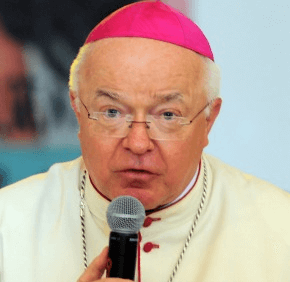By Carol Glatz
Catholic News Service
VATICAN CITY – Vatican magistrates have decided to postpone the proceedings of a criminal trial against a former Vatican nuncio due to the defendant’s ill health.
However, during the trial’s opening session July 11, Vatican prosecutors formally listed all the charges against the laicized former archbishop, Jozef Wesolowski. Only two charges — the sexual abuse of minors in the Dominican Republic and possession of child pornography in Rome — had been made public in mid-June.
Vatican magistrates also have indicted him on charges of causing serious psychological distress and harm to adolescent victims of sexual abuse and for offending religious and Christian morals with his repeated use of online pornography abroad and on Vatican City State property.
The Vatican trial was adjourned until an unspecified future date because the defendant was in an intensive care unit in a “public hospital” in Rome after experiencing a “sudden illness” the afternoon of July 10, according to a Vatican communique. The Vatican tribunal is typically closed for summer recess from mid-August to the end of September.
During the opening hearing, which lasted just six minutes, the Vatican prosecution read out the following five charges against Wesolowski:
— Procuring and possessing on Vatican City State property “and elsewhere,” a “large amount” of “material from Internet sites” depicting minors under the age of 18 in sexually explicit acts or poses.
— Having “corrupted, by means of lewd acts, adolescents presumably between the ages of 13 and 16,” in the Dominican Republic, where Wesolowski had served as a Vatican nuncio from 2008 to 2013 when he was recalled to the Vatican. Vatican prosecutors said the acts occurred “at least once out in public” and at least once in the presence of Francisco Javier Occi Reyes, a deacon. According to news reports, Occi, who was arrested in 2013 for soliciting minors, confessed in a letter that he solicited the children for the former archbishop.
— Having acquired, received, hidden or possessed on two computers child pornography “and therefore, things deriving from a crime.”
— Having caused “serious injury to adolescent victims of sexual abuse, consisting of mental distress.”
— Having “harbored conduct that offends religious principles or Christian morality” by repeatedly logging on to pornographic sites while in the Dominican Republic, Rome, Vatican City State and elsewhere.
The defendant’s lawyer, Antonello Blasi, told pool reporters after the opening session that he only just learned about his client’s hospitalization that morning.
After the hearing he asked to review the medical evidence that had been handed to the court judge certifying the former archbishop’s condition, which was not made public to protect the patient’s right to privacy.
Blasi told pool reporters that the last time he saw his client was “two or three days ago” and that considering the man’s age and the circumstances, he had looked to be in good health. Wesolowski turns 67 July 15.
The July hearing was the first criminal trial by the Vatican court for the allegation of sexual abuse of minors.
Vatican City State authorities had carried out their own criminal investigation, which included a number of sessions of interrogating the former archbishop.
The criminal charges against the Polish national, who still has Vatican City State citizenship, were possible after 2013, when Pope Francis approved new and expanded criminal laws, which became applicable to all Vatican employees around the world. Any direct employee of the Holy See, including those working in a Vatican office or nunciature, can face a criminal trial at the Vatican as well as face criminal prosecution in the country where the crimes occurred.
Vatican City civil laws are separate from the universally applicable canon law, norms and sanctions, which require bishops around the world to turn over to the Congregation for the Doctrine of the Faith cases of priests accused of child sexual abuse or possession of child pornography.
Wesolowski was dismissed from the clerical state in June 2014 after the doctrinal congregation’s investigation.
Copyright (c) 2015 Catholic News Service/U.S. Conference of Catholic Bishops
Also see:
Pope says he’ll read critiques of his economic thought before U.S. trip
Pope says Paraguayans in poor barrio remind him of Holy Family
South America, Cuba-U.S. trip itineraries show heart of pope’s faith


